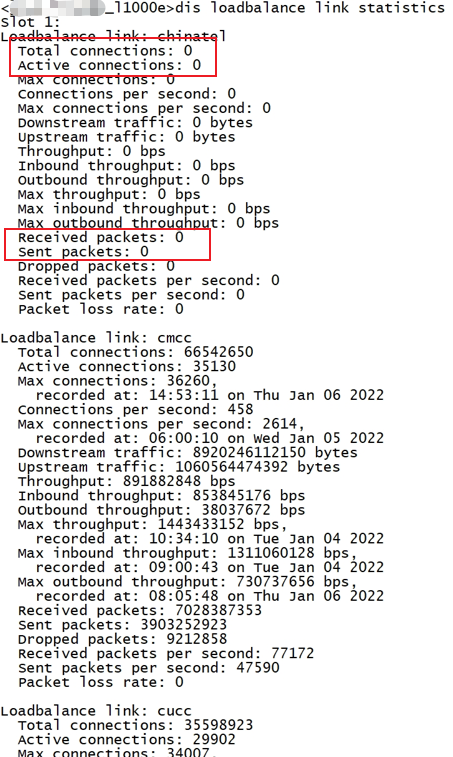There is no traffic problem on a certain link of ISP outgoing link load balancing
- 0 Followed
- 0Collected ,3416Browsed
Network Topology
Not involving
Problem Description
The site is configured with ISP-based outbound link load balancing, with three links including China Unicom, China Mobile, and China Telecom. The feedback is that there is no traffic on the telecommunications link when the link status is normal.
Process Analysis
1. On-site tracert and Telecom DNS address test found that the exit via the mobile link was out. Checking the load balancing link statistics, we also found that the telecom link counts are all 0, with no traffic, and the other two links are normal.

2. Confirm that the router IP configuration of each link on site is correct and reachable, the health check is correct, and the link status is active.

3. Clear the test access session for the telecom DNS address, and use the loadbalance schedule-test command to confirm the link load of the address.
< l1000e>reset session table ipv4 destination-ip 202.xxx.xx.68
This operation might cause session inconsistency between the master and backup devices or service interruption. Continue? [Y/N]:y
< l1000e>loadbalance schedule-test ip protocol icmp destination 202.xxx.xx.68 source 10.x.xxx.1
Matched virtual server: vs
Matched the default class.
Forward type: Forward all
It was found that the traffic accessing the telecom address matched the default class, and the forward all forwarding action configured on site was executed. Therefore, the reason for taking the mobile egress was that the traffic did not match the telecom ISP entry and was forwarded to the mobile egress.
#
loadbalance action default type link-generic
forward all
#
loadbalance policy default type link-generic
class chinatel action chinatel
class cucc action cucc
class cmcc action cmcc
default-class action default
#
4. After confirming that the on-site ISP routing table has been imported correctly, check the configuration again and find that there are three matches in the configuration of the telecom load balancing class. The type of load balancing class is link-generic, and no match-all or match-any parameters are added. The default value is match-all, which means that all rules need to be matched to match this category. Therefore, according to the on-site configuration, when accessing a telecom address, the address must satisfy chinatel, educn, and cn entries at the same time, so that the traffic will be matched. The load balancing class of Telecom performs the corresponding forwarding action to the Telecom link. The other two links have only one match category. The effect is the same with or without the match-all or match-any parameters. Let the site add the match-any parameter in the telecom loadbalance class configuration and the traffic accessing the telecom address can be successfully loaded to the telecom link.
#
loadbalance class chinatel type link-generic
match 1 isp chinatel
match 2 isp educn
match 3 isp cn
#
loadbalance class cmcc type link-generic
match 1 isp cmcc
#
loadbalance class cucc type link-generic
match 1 isp cnc
#
Solution
Add the match-any parameter in the telecom loadbalance class configuration. match-any means that you only need to match any rule to match the class. When there are multiple matching conditions in the load balancing class, we need to pay attention to the configuration of this parameter.
[ match-all | match-any ]: Requires matching all rules or any rule of the LB class. match-all is the default match mode.
